Falcon9
Latest

SpaceX delays its return to flight until early January
So much for SpaceX resuming rocket launches before 2016 is over. Elon Musk's spaceflight company now expects to launch a Falcon 9 rocket in early January, when it will carry Iridium-1 into orbit. Iridium had previously hinted that the rocket might be ready as soon as December 16th, but SpaceX says it's using the extra time for both vehicle prep and "extended testing" to make sure this return to flight goes according to plan.

NASA is concerned about SpaceX's rocket fueling practices
NASA is a little nervous about SpaceX's future crewed flights. The Wall Street Journal has obtained a letter from December 2015 showing that an agency International Space Station committee has been worried about the safety of SpaceX's planned fueling strategy. While the nature of SpaceX's Falcon 9 rockets will require that it fill up while the crew is aboard (it has to supply the supercooled fuel 30 minutes before launch), that goes against "50 years" of booster safety practices around the world, according to the letter. The committee raised the issue again with NASA officials days before SpaceX's launchpad explosion, but hadn't heard anything for weeks afterward.
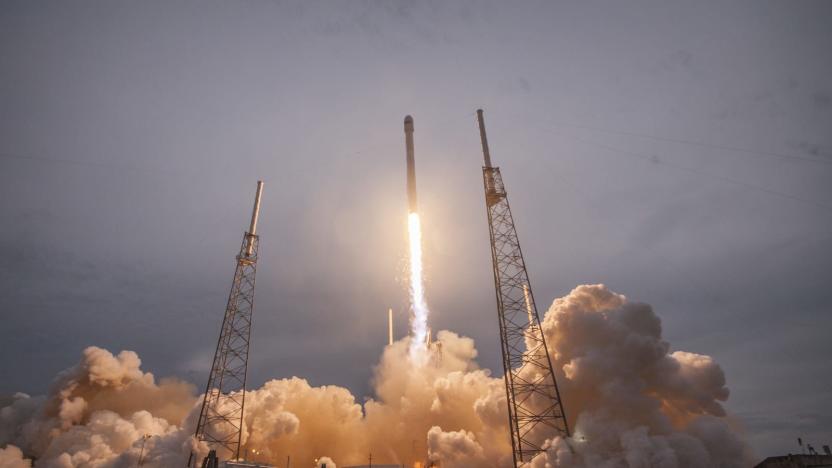
SpaceX engineers have solved their exploding rocket mystery
Investigators looking into September's Falcon 9 explosion believe they have finally found their culprit, CEO Elon Musk said during an appearance on CNBC today. According to Musk, the explosion that destroyed the rocket and its payload was caused by a "really surprising problem that's never been encountered before in the history of rocketry."
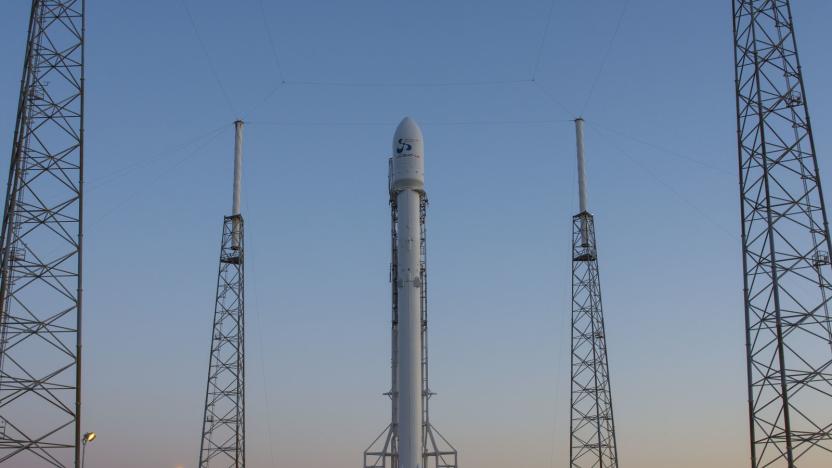
SpaceX is ready to resume testing rockets following its accident
SpaceX hasn't yet pinpointed the ultimate cause of its Falcon 9 explosion from September, but it's far enough into the investigation that it's ready to get back to business. The private spaceflight firm now says its inquiry is in an "advanced state," and it's confident enough that it plans to resume stage testing in Texas within the "coming days." The company still hopes to resume flight by the end of the year.
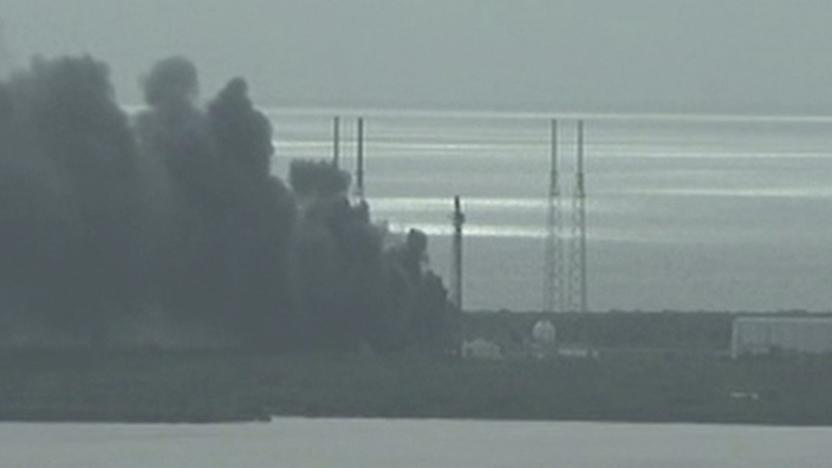
SpaceX thinks Falcon 9 blew up due to a helium system breach
SpaceX is still in the midst of examining every video, audio and image of the September 1st Falcon 9 explosion, but it's already found one possible explanation for the unfortunate event. According to the private space corp's latest update, the huge explosion might have been caused by a large breach in the rocket's helium pressurization system. The company also clarified that what happened wasn't a repeat of the CRS-7 incident, another failed rocket launch last year that was caused by a faulty strut.

SpaceX hopes to fly again by November, delays Falcon Heavy
On September 1st, a SpaceX Falcon 9 rocket (and a Facebook satellite) unexpectedly exploded on the launch pad at Cape Canaveral. The company doesn't yet know what caused it, but it's not letting the setback get them down. Today, SpaceX president and COO Gwynne Shotwell said the company hopes to return to flight in November. "We're anticipating getting back to flight, being down for about three months," Shotwell said, speaking at a conference in Paris. "November time-frame."
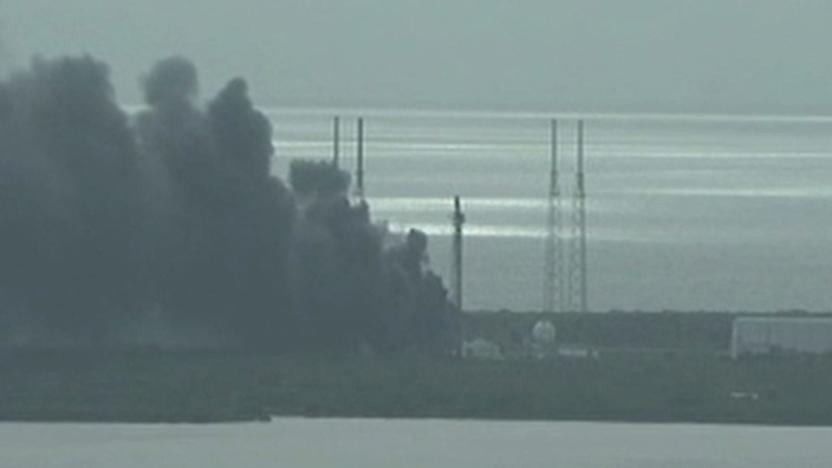
Elon Musk seeks public footage for SpaceX investigation
Earlier this month, SpaceX lost a Falcon 9 rocket (and a Facebook satellite) on the launch pad in Cape Canaveral. Naturally, Elon Musk is not taking the explosion lightly, and the outspoken CEO has already turned to Twitter to help his company find the cause of the explosion.

SpaceX asked to pay $50 million after losing a satellite
SpaceX may have to deal with more than equipment losses and Mark Zuckerberg's disappointment in the wake of its launchpad explosion. Spacecom, which owned the AMOS-6 satellite destroyed in the incident (and part of Facebook's free internet plans), is asking SpaceX for either $50 million or a free flight as compensation. The loss will have a large impact on Spacecom's bottom line, as you might imagine. The Israeli firm is estimating that it'll lose between $30 million to $123 million in equity.

SpaceX Falcon 9 rocket explodes on launch pad in Cape Canaveral (updated)
During a pre-launch test this morning, a SpaceX Falcon 9 rocket exploded in Cape Canaveral, Florida. The spacecraft was sitting on a launchpad ahead of a scheduled launch this Saturday to take an AMOS-6 communications satellite into orbit for the Israeli company Spacecom. That satellite is a joint effort between Facebook and France's Eutelsat to provide internet connectivity to 14 African countries. Some reports indicated that the explosion shook office buildings some distance away.
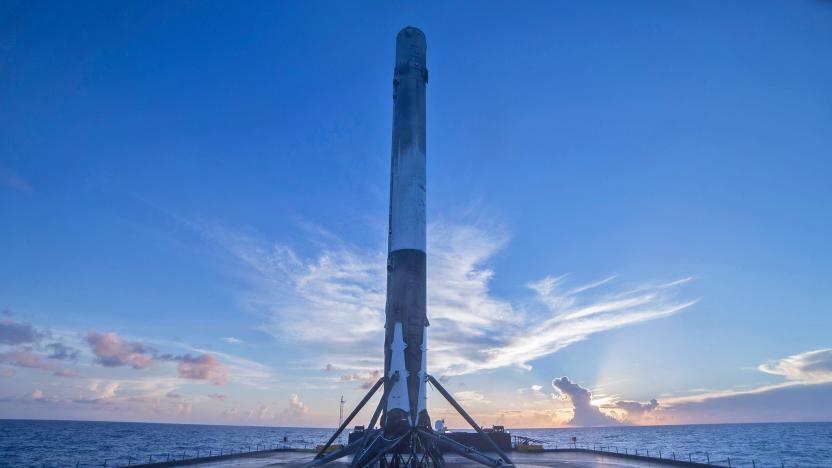
SpaceX to launch SES satellite on a reused Falcon 9 rocket
Satellite operator SES will be the first company to launch a spacecraft on a 'second-hand' SpaceX rocket. The Falcon 9 which travelled to the ISS in April, before landing on a drone ship in open water, will be called upon for the new flight later this year. Blast-off is scheduled for the fourth quarter of 2016 and will be used to send an SES-10 satellite into a geostationary orbit over Latin America. Here, it'll deliver "direct-to-home broadcasting, enterprise and mobility services" to people back on the surface.
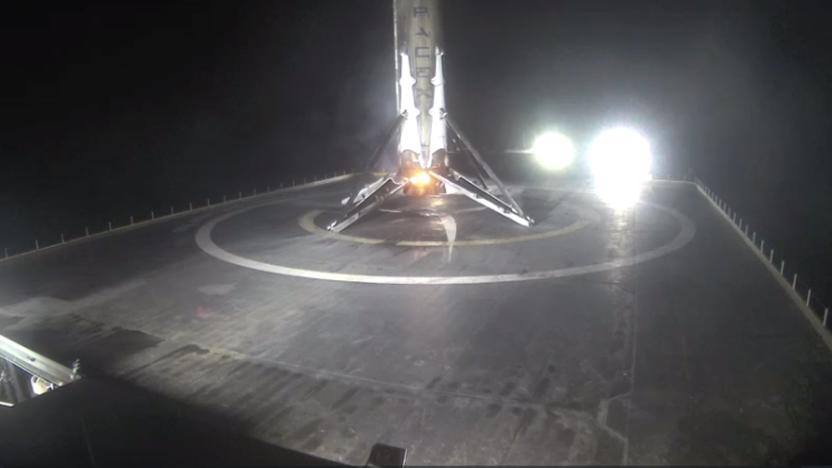
SpaceX nails a tricky fourth rocket landing at sea
SpaceX is good enough at sea-based rocket landings that they've nearly become commonplace. The private spaceflight outfit has successfully landed a Falcon 9 rocket aboard a drone ship for the fourth time, or its sixth landing overall. And this wasn't a particularly easy trip, either. On top of the inherent challenges of a sea landing, the destination for the rocket's payload (the JCSAT-16 communications satellite) meant that the vehicle had to contend with both "extreme velocities" and high re-entry heat.

SpaceX wants two more landing pads for Falcon Heavy rocket
What's better than watching one of SapceX's Falcon 9 reusable rockets land? Watching three of them land. At the same time! Okay, that spectacle isn't here quite yet, but Elon Musk's rocket company is working on it: SpaceX recently announced that it's seeking federal approval to build two additional landing pads at Cape Canaveral -- giving it enough space to attempt a ground landing for a heavy rocket with two recoverable boosters.
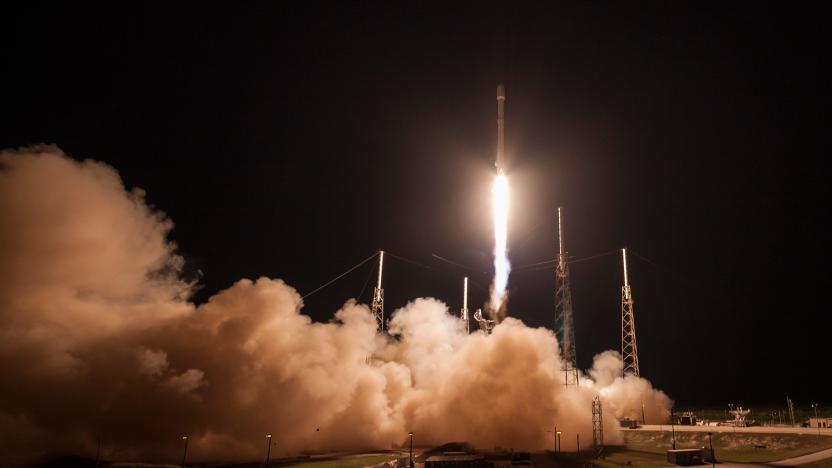
Watch SpaceX try its second ground landing (update: success!)
Now that sea-based rocket landings are relatively commonplace for SpaceX, the company is hoping to achieve repeat success with ground landings. Elon Musk and crew are launching a Dragon capsule full of cargo to the International Space Station on July 18th at 12:45AM Eastern, and they're using this nighttime mission to attempt the second-ever ground landing of a Falcon 9 rocket. You can watch SpaceX's live stream below starting at 12:25AM.

SpaceX picks its first rocket to fly a second time
Sure, SpaceX promised to reuse a rocket sometime in September or October... but which rocket? At last, we know. As part of a NASA presentation, SpaceX has revealed that it will be using the second Falcon 9 to make a successful landing (in this case, on a drone ship). Why not the first, you ask? If you'll recall, Elon Musk sees it as a museum piece. He doesn't want to lose the most historically important machine.

Last SpaceX rocket landed hard enough to 'accordion' the engines
Don't start thinking that landing a rocket's first stage is routine just yet, as SpaceX has just posted video of its latest attempt. The Falcon 9 rocket successfully delivered two satellites to orbit, however when it returned to Earth everything did not go exactly to plan. The live video feed cut out so we weren't sure exactly what happened, but now Elon Musk has tweeted video from afar showing the landing process. According to Musk, one of the engines cut out before it hit the deck of the droneship, causing a landing hard enough to "destroy the primary airframe and accordion the engines." We're guessing there's not enough left for this one to join the trophy case, but that's just how it happens in 2016, which Musk is calling "the year of experimentation."

SpaceX aims to relaunch one of its rockets this fall
SpaceX is gearing up for something huge this fall. Elon Musk announced on Twitter that the Falcon 9 that launched the Thaicom 8 communications satellite is back in the hangar with the three other first stages that made it safely back on the ground. In the same tweet, he revealed that the company is planning for its first reflight in either September or October. The private space corp originally aimed to relaunch a rocket in May or June after its first successful barge landing, but that was obviously too soon to be feasible.

SpaceX doesn't expect to stick the landing of tonight's launch
Make a pot of coffee and curl up in your favorite bunny slippers tonight for another SpaceX rocket launch and attempted sea landing. The Falcon 9 rocket will take off from Cape Canaveral, Florida, at 1:21AM ET on Friday, May 6th, carrying a Japanese communications satellite (JCSAT-14). It's headed for a precariously high orbit, which makes re-entry and landing extra difficult. Still, SpaceX will attempt to set the rocket back down on the "Of Course I Still Love You" barge. Update: And we have another successful ocean landing! The rocket launched on schedule and its first stage landed safely on the drone ship a few minutes later. Check after the break for the ongoing livestream and replay.
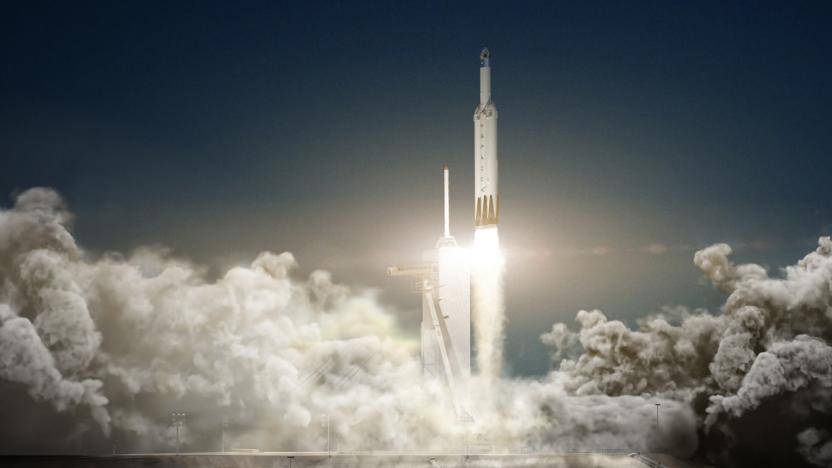
SpaceX: our Falcon rockets are more powerful than we thought
If you thought SpaceX was already making a fuss over the capabilities of both its existing Falcon 9 rocket and the upcoming Falcon Heavy, you haven't seen anything yet. The company has posted updated specs showing that both vehicles are more powerful than previously thought. A Falcon 9 is now known to be capable of hauling 50,265lbs to low Earth orbit, up from just shy of 29,000 pounds. The Falcon Heavy, meanwhile, will carry 119,930lbs instead of the previously promised 116,845lbs. Elon Musk chalks up the improved figures to more thorough testing -- SpaceX hasn't upgraded the hardware, at least not yet.
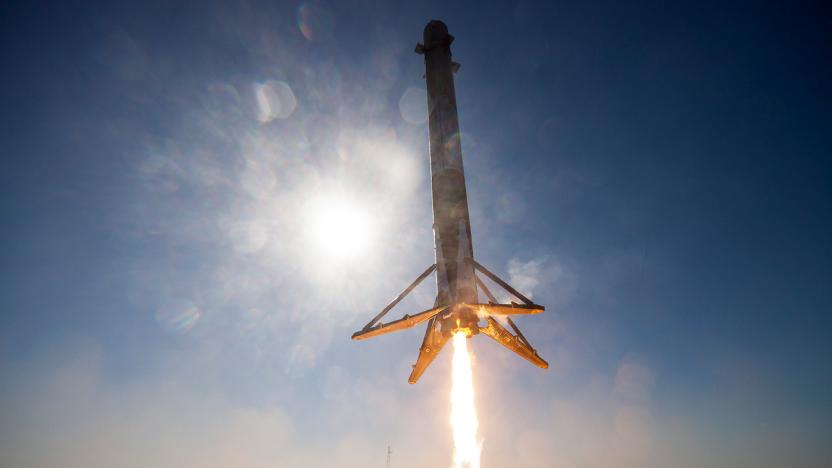
Watch a 360-degree video of SpaceX's rocket landing at sea
If you've ever had any doubt whether SpaceX's Falcon 9 really touched down on a barge, you should watch this YouTube video. It shows a 360-degree view of the drone ship as the rocket was landing, which means you can drag the video around to watch it from different angles or view it using a VR headset. SpaceX successfully landed its reusable rocket at sea for the first time in early April after several failed attempts. The historic booster was transported back to the Kennedy Space Center to make sure everything's working properly. If it's still in perfect condition, the commercial space company might launch it again at a later date.

SpaceX proves its reusable rocket can land at sea
The folks at SpaceX have successfully demonstrated that their Falcon 9 rocket really is capable of blasting off to orbit and landing back down on a drone ship. It stuck a ground landing back in December 2015 after a handful of failed attempts to land at sea -- Falcon 9 reached the barge and nearly made it in all those previous instances, but something always went awry. This time, the rocket gracefully touched down on the ship named "Of Course I Still Love You" after ferrying a Dragon capsule with supplies for the ISS, thanks in part to its recent upgrades.






